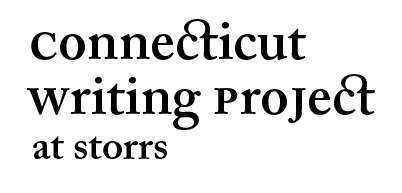
The Connecticut Writing Project (CWP)
The CWP-Storrs, one of the oldest sites of the National Writing Project, was established at the University of Connecticut in 1982. Since 1986, the site has benefitted from funding from the Aetna Endowed Chair of Writing. Through its annual Invitational Summer Institute, the CWP offers opportunities for professional growth to teachers in all disciplines who recognize the worth of using writing as a means of learning any subject matter. Improving writing skills improves thinking skills and thus leads to higher levels of achievement in all areas. In addition, the CWP offers professional development services to schools and school districts, and a variety of opportunities for students to publish their writing.
Mission Statement
The National Writing Project (NWP) is a professional development network that serves teachers of writing at all grade levels, primary through university, and in all subjects. The mission of the NWP is to improve student achievement by improving the teaching of writing and improving learning in the nation’s schools.
Early History Project
In 2009, the Connecticut Writing Project at Storrs began collecting information for its comprehensive Early History Project, an effort encouraged by the National Writing Project to chronicle the history, progress, and influence of this organization over the years.
A Network of University-Based Sites
The more than 200 local sites that make up the NWP network are hosted by universities and colleges. Codirected by faculty from the local university and from K–12 schools, local sites serve all 50 states, the District of Columbia, Puerto Rico, and the U.S. Virgin Islands. Sites work in partnership with area school districts to offer high-quality professional development programs for educators. NWP continues to add new sites each year, with the goal of placing a writing project site within reach of every teacher in America. The network now includes two associated international sites.
A Successful Model Customized for Local Needs
NWP sites share a national program model, adhering to a set of shared principles and practices for teachers’ professional development, and offering programs that are common across the network. In addition to developing a leadership cadre of local teachers (called “teacher consultants”) through invitational summer institutes, NWP sites design and deliver customized inservice programs for local schools, districts, and higher education institutions, and they provide a diverse array of continuing education and research opportunities for teachers at all levels.
National research studies have confirmed significant gains in writing performance among students of teachers who have participated in NWP programs.
The NWP is the only federally funded program that focuses on the teaching of writing. Support for the NWP is provided by the U.S. Department of Education, foundations, corporations, universities, and K-12 schools.
NWP Core Principles
The core principles at the foundation of NWP’s national program model are:
- Teachers at every level—from kindergarten through college—are the agents of reform; universities and schools are ideal partners for investing in that reform through professional development.
- Writing can and should be taught, not just assigned, at every grade level. Professional development programs should provide opportunities for teachers to work together to understand the full spectrum of writing development across grades and across subject areas.
- Knowledge about the teaching of writing comes from many sources: theory and research, the analysis of practice, and the experience of writing. Effective professional development programs provide frequent and ongoing opportunities for teachers to write and to examine theory, research, and practice together systematically.
- There is no single right approach to teaching writing; however, some practices prove to be more effective than others. A reflective and informed community of practice is in the best position to design and develop comprehensive writing programs.
- Teachers who are well informed and effective in their practice can be successful teachers of other teachers as well as partners in educational research, development, and implementation. Collectively, teacher-leaders are our greatest resource for educational reform.
***From the National Writing Project
- We encourage all teachers to view themselves as writers and teachers of writing.
- We advocate that writing facilitates learning in all disciplines and grade levels.
- We share knowledge about writing and the teaching of writing.
- We provide practical, theory-based professional development.